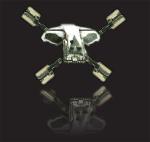The fact that most games that do rely fairly heavily on tactics tend to be slower. You rarely see games that can be described as "High Speed Tactical Action", you know?
The only reason that slower games are at all associated with tactics is that their skill ceilings are low as balls. In other words, everyone hits the skill cap much more quickly, and there isn't much difference between players of different ability tiers - certainly not like the differences you'd see in a game like Unreal 2 XMP, UT, or Quake. As a result, tactics are required at much lower skill tiers than would be seen with most arena shooters (and the upper skill tiers are more populated because they're more easily reached).
Slower games are not inherently more tactical. Omniscient has run the gamut in competitive games, and I can tell you that the most strategically- and tactically-involved games were the fastest: Unreal 2 XMP, UT2k3, and Fallen Empire: Legions. Slower-paced games like Lineage 2 (very slow), World of Warcraft (also very slow), Battlefield 3 (pretty slow) and Hawken (medium slow) require comparatively little thought. Faster games require that players respond quickly (and appropriately) to rapidly-shifting scenarios. Additionally, the enhanced movement options mean that they've a larger pool of options from which to pull, as well as a larger pool of options to defend against. Finally, response-based tactics must be coordinated and executed within moments because players can shift positions and formations so quickly.
If you were to gather a team and run against mine in Unreal Tournament, you'd be utterly trounced because of the skill differential. Strategy and tactics would play a part, but you wouldn't notice while running against that differential. However, the depth of those strategies and tactics would become evident if my team were playing against a team possessing similarly-skilled players.
It's the same thing in Hawken, although to a much lesser degree (skill ceiling's a lot lower).
Edited by Nept, 18 April 2015 - 01:30 PM.
 Sign In
Sign In Create Account
Create Account




 This topic is locked
This topic is locked

 Back to top
Back to top

























